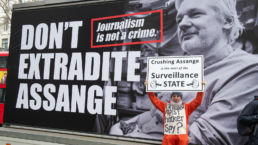As Biden pursues Julian Assange, the WikiLeaks co-founder is exhausting resources and appeals and a trial in U.S. court seems inevitable.
By Jeffrey Brodsky, Discourse
In its prosecution of WikiLeaks co-founder Julian Assange, the Biden administration is setting up one of the most important court cases on press freedom in decades. Did Assange break the law by publishing classified information that others may have stolen? If he did, then much of the work of investigative reporters—who often depend on secret government, individual or corporate information leaked by sources—might also be illegal

The Justice Department got a win in December when a British appellate court ruled that Assange can be extradited to the U.S. The British High Court then declined this month to hear an appeal. Assange does have other avenues for appeal, but time is running out. The U.S. indicted him back in 2019 on charges related to WikiLeaks receiving and publishing thousands of military and diplomatic documents leaked in 2010. The U.S. charged him under the Espionage Act, under which no journalist or publisher has ever been convicted. If he’s found guilty of all charges, the 50-year-old Assange, who is an Australian national, could be sentenced to up to 175 years in prison.
The Justice Department’s pursuit of Assange under President Biden is one and the same as the actions it took under President Trump. This has surprised some press freedom, civil liberties and human rights groups, which expected that Biden would be a better ally on issues of press freedom. Some 25 such groups urged in a letter to Attorney General Merrick Garland in October that he drop the charges because they “pose a grave threat to press freedom both in the U.S. and abroad,” but the Biden administration is determined to plow ahead.
Recent Posts
“Arrest Now, Ask Questions Later”: Why Did L.A. ICE Agents Arrest and Jail U.S. Citizen Andrea Velez?
July 3, 2025
Take Action Now “They didn’t have vests that said ICE or anything. Their cars didn’t have license plates. … Just because of the color of our…
Trump’s Big, Beautiful Bill Is Naked Class War
July 3, 2025
Take Action Now Trump’s “Big, Beautiful Bill” trades tax cuts on millionaires for the dissolution of society.By Hamilton Nolan, In These Times…
Mayor Mamdani’s First Day, A Zero Hour Conversation With Richard Wolff
July 2, 2025
Take Action Now If elected, what would Mayor Mamdani do on his first day in City Hall? How would a democratic socialist govern as a big-city mayor?……
The U.S. Is Funding A Bloodbath At Gaza Aid Centers
July 2, 2025
Take Action Now The admin just gave $30M to GHF, the organization at the center of charges that Israel is weaponizing assistance and shooting at…




